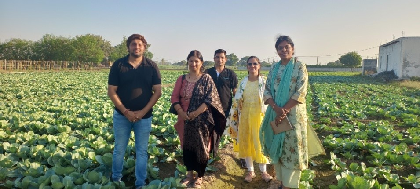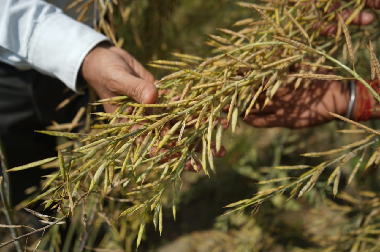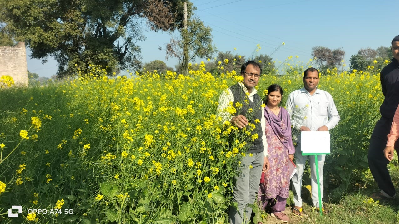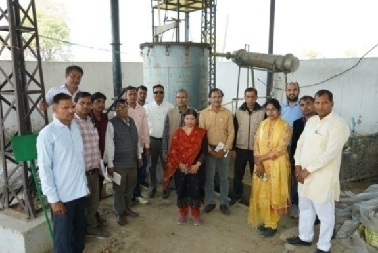India’s small and marginal farmers who account for over 85% of all agricultural holdings form the backbone of national food security. Yet, they continue to face deep-rooted challenges such as fragmented landholdings, low productivity, limited access to post-harvest infrastructure, and weak market linkages. To overcome these systemic barriers, the Farmer Producer Organization model has emerged as a transformative mechanism that enables collective production, value addition, and enterprise-led rural development.

With institutional support from NABARD, ICAR–Indian Agricultural Research Institute, and allied partners, FPOs in the National Capital Region are being redefined as technology-integrated agri-enterprises, driving Atmanirbhar Krishi and sustainable rural industrialization. Two such FPOs Adhirayansh Organics Producer Company Ltd. in Palla, Delhi, and Hodal Farmers’ Producer Company Ltd. (HFPCL) in Palwal, Haryana stand out as exemplary models demonstrating how innovation, technology, and collective entrepreneurship can reshape smallholder agriculture into profitable, sustainable, and resilient enterprises.
Solar-Powered Cold Storage and Digital Agriculture: The Adhirayansh Organics Model
Registered in 2021, AOPCL operates under the project “Off-Grid Clean Energy Cooling for Affordable Storage of Perishables for BOP Farmers”, implemented jointly with ICAR–IARI and USAID, with financial facilitation from NABARD. The centerpiece of this initiative is the Pusa Farm SunFridge a solar-powered cold storage system designed to preserve perishable commodities efficiently and affordably.
The system, with a large capacity and a temperature range of 4–15°C for 7–10 days, operates on a hybrid solar and off-grid power supply, ensuring uninterrupted functioning even in areas with irregular electricity. This innovative cold storage has dramatically reduced post-harvest losses by up to 70% while improving farmer incomes by 25–35%.

In addition, AOPCL has adopted IoT-based AgroTrace technology for real-time crop monitoring. Sensors track temperature, humidity, and crop growth data, enabling farmers to optimize harvest timing and storage schedules. The integration of renewable energy and digital monitoring not only ensures better product quality and shelf life but also provides employment opportunities to rural youth, promotes climate resilience, and serves as a replicable model for peri-urban vegetable clusters across India.
Diversified Enterprises Empowering Rural Livelihoods: The Hodal FPO Experience
Established under the Companies Act and supported by NABARD, Hodal Farmers’ Producer Company Ltd. (HFPCL) has evolved into a multi-enterprise FPO managing operations across Maholi and Hodal villages in Palwal district, Haryana. Under the ICAR–IARI project “Assessment and Outscaling of ICAR-IARI Technologies for Enhancing Farm Income” (CATAT) and technical guidance from CIMAP, Lucknow, the FPO has diversified its business portfolio to include lemongrass essential oil extraction, mustard oil expelling, and a Custom Hiring Centre (CHC).
Alongside enterprise development, HFPCL has strengthened local input and seed systems, obtained a fertilizer license, and supplies certified high-yielding varieties to its members. Through farmer participatory seed multiplication programs, it ensures the timely availability of quality seeds while maintaining varietal purity. The adoption of balanced fertilization, precision sowing, and integrated pest management has enhanced productivity and resource efficiency, improving the overall socio-economic resilience of member farmers.
Table1: Economic and Technical Performance
Crop | Post harvest Loss Before (%) | Post harvest Loss After (%) | Price Gain (%) | Income Gain (%) | Investment (Rs. lakh) | Annual Operating Cost (Rs. lakh) | Gross Income (Rs. lakh) | Net Return (Rs. lakh) | B:C Ratio |
Tomato | 70 | 10 | 25 | 30 | 6.5 | 0.7 | 4.5 | 3.8 | 2.85 |
Okra | 60 | 12 | 22 | 25 | 6.5 | 0.7 | 4.0 | 3.3 | 2.75 |
Cucumber | 65 | 8 | 30 | 35 | 6.5 | 0.7 | 4.7 | 4.0 | 3.10 |
Brinjal | 68 | 11 | 20 | 25 | 6.5 | 0.7 | 4.1 | 3.4 | 2.90 |
Lemongrass Oil Enterprise: Turning Aromatic Crops into Profitable Ventures
Among HFPCL’s flagship ventures, lemongrass cultivation and oil extraction stand out as a model of value addition through scientific management. Farmers cultivate the high-yielding cultivar Pragati (LS48), known for its superior oil content and quality. The harvested biomass is processed through a 500-liter direct steam distillation unit, completing a batch in about 3.5–4 hours with an impressive oil recovery rate of 0.4% (4 kg per tonne of fresh biomass).
The resulting lemongrass oil, rich in citral (74–78%), meets international standards and is in demand across cosmetic, fragrance, and pharmaceutical industries. Economically, the enterprise yields a gross income of ₹1.56 lakh per hectare against a total cost of ₹50,178, delivering a net return of ₹1.06 lakh per hectare and a B:C ratio of 3.12. Beyond profitability, the model supports sustainable agriculture, requiring minimal chemical inputs and improving soil health, making it a replicable livelihood model for smallholders venturing into high-value aromatic crops.

Community-Based Mustard Oil Expeller: Local Value Addition for Higher Returns
HFPCL’s community oil expeller model has empowered farmers to process their own mustard produce, transforming a basic crop into a profitable value-added product. From 1,900 kg of mustard seed per hectare, farmers extract about 785 liters of oil (recovery rate: 37–38%), valued at ₹195 per liter, and 1,178 kg of mustard cake, a nutritious livestock feed, sold at ₹3 per kg. Together, the enterprise generates a gross revenue of ₹1.56 lakh per hectare against a total cost of ₹50,178, yielding a net return of ₹1.06 lakh and a B:C ratio of 3.12.
Compared to selling raw seed, which provides only a net return of ₹58,500, value addition through processing nearly doubles profitability, while creating local jobs, encouraging entrepreneurship, and ensuring efficient use of by-products. The model exemplifies inclusive agro-enterprise development, combining financial viability with community empowerment.
Custom Hiring Centre: Mechanization for All
To address the challenges of limited access to farm machinery, HFPCL established a Custom Hiring Centre (CHC) that rents modern agricultural equipment to small and marginal farmers at affordable rates. Services include ploughing, rotavation, sowing, spraying, threshing, and residue management, offered at nominal hourly charges.
With a total investment of ₹10 lakh, the CHC generates an annual gross income of ₹5.4 lakh and a net return of ₹3.8 lakh, achieving capital recovery within 2.6 years. Beyond profitability, the CHC reduces labor dependency, enables timely and precise field operations, and enhances productivity across member farms. It also promotes shared resource use, minimizes idle machinery, and strengthens the FPO’s role as a rural service hub for mechanization and agricultural innovation.

Impact and Replicability
The experiences of AOPCL and HFPCL collectively underscore how technology-enabled FPOs can serve as catalysts of rural transformation. By integrating clean energy solutions, digital tools, value-added processing, and inclusive mechanization, these organizations have demonstrated that smallholders can move beyond subsistence farming to become agri-entrepreneurs.
Their success stories highlight a synergistic model of institutional collaboration where NABARD’s financial facilitation, ICAR–IARI’s technological support, and farmers’ collective enterprise converge to drive sustainable, profitable, and inclusive rural industrialization. Together, these FPOs exemplify the future of Atmanirbhar Krishi where innovation, sustainability, and community empowerment go hand in hand to shape a resilient rural economy.
(Source: ICAR–Indian Agricultural Research Institute, New Delhi)







फेसबुक पर लाइक करें
यूट्यूब पर सदस्यता लें
X पर फॉलो करना X
इंस्टाग्राम पर लाइक करें